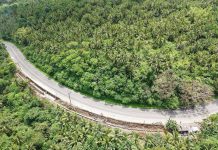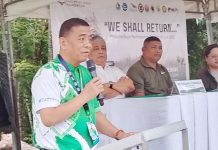TACLOBAN CITY— Government rehabilitation works in areas hit by supertyphoon Yolanda close to a year now is “slow,” despite of reported billions of dollars it received from various countries and organizations.
This was the assessment made by IBON Foundation, a leading think-tank group adding that the government failed to deliver in its rehabilitation efforts in areas devastated by the deadly storm. “Government efforts for the recovery of the affected areas are moving very slowly; the slow recovery efforts are on top of earlier criticisms of poor emergency response and relief work last year despite considerable resources already at hand from international, national, and local sources,” the think-tank group said. “Millions of victims who were already in very poor and vulnerable conditions even before the typhoon Yolanda continue to endure barely survival conditions,” it added. “Approaching typhoon Yolanda’s first anniversary, real community development escapes them and they face a future of being put in a ‘new normal’ of an even lower level of existence than they had before,” IBON reported.
The group, citing reports from the Office of the Presidential Assistant for Rehabilitation and Recovery (OPARR), said the government “tend to show that Yolanda victims are still in the relief phase and barely starting to recover almost a year after the typhoon struck.” “The largest number of Yolanda victims remains in uncertain and unstable conditions with abnormal and uncertain livelihoods. Although 1.5 million families were affected, only 215,471 families are reported to have benefited from Cash for Building Livelihood Assets projects,” it said. The foundation also said that victims remain largely in temporary and transitional shelters. Some 1.2 million houses were damaged or destroyed, of which some 500,000 were completely destroyed. The OPARR however only reports 364 housing units completed in Tacloban and Tanauan, Leyte. It also said that only 44,870 fishermen were provided with fishing gears; another 32,081 were able to have new bancas or were just repaired and only 4,507 seaweed farmers were assisted by the government. In the agriculture sector, only 9,149 farmers were provided farm implements and another 2,482 farmers given seeds and 160 farmers helped with animal restocking. Just 27 public markets out of the target 132 have been repaired or rehabilitated and only 58 kilometers of farm-to-market roads out of the target 315 kilometers have been rehabilitated or constructed, the think-tank said.
On education, IBON, citing OPARR, said that “children are still unable to return to school buildings and classrooms.” “ Some 6.9 million textbooks, learning materials and learning kits and 517 computer packages are being distributed. Yet only 213 classrooms have been repaired out of the target 19,648 classrooms. Only 13 health facilities have been rehabilitated. Meanwhile some 18 doctors, 668 nurses and 233 midwives have been deployed in Regions VII and VIII, the report said. IBON also noted that its efforts to rebuild infrastructures “are also moving slowly.”
“ Only 5.8 kilometers of national roads have been repaired or rehabilitated out of a target 116 kilometers, three bridges out of a target 34 bridges, six ports out of a target 43 port facilities, 33 out of 99 flood control facilities, 25 municipal halls out of a target 153 municipal, city and provincial halls, and 21 out of 161 civic centers,” IBON said in its report published online. For the marginalized survivors in Tacloban City battered by Yolanda, they said that help from the government continue to elude them. “The urban poor in Tacloban are being exiled to distant relocation sites and forced to live in substandard housing. They are also uprooted from their means of livelihood, because many are fishermen and vendors whose sources of income are near the coastal communities,” said Joel Abaño, spokesman of urban peasant group Kadamay.
Abaño, in a statement, criticized the government’s Recovery Assistance on Yolanda (RAY) which “essentially displaced them in favor of corporate interests.” RAY is pushing such anti-poor policies like the “no build zones” and “no dwelling zones” to get rid of the urban poor in Tacloban, added Abaño. “The Aquino government hypocritically imposed the ‘no build zones’ and ‘no dwelling zones’ in the name of safety for the affected communities, while encouraging corporations to take advantage of the vacated locations to build their businesses,” Abaño said. (RONALD O. REYES)



